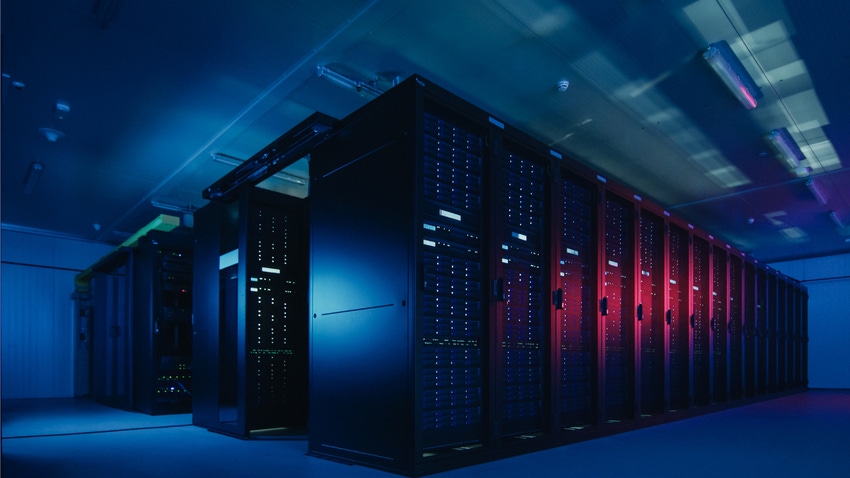Dell, HPE, Lenovo and Nvidia Tout AI Hardware Solutions to Enterprises
Hardware vendors are rushing to deliver AI servers or AI supercomputer cloud services to meet enterprise needs

At a Glance
- Major hardware makers unveiled new AI-optimized servers or supercomputing services to meet demand for AI deployment.
- Nvidia, Dell, Lenovo, HPE are among those that recently unveiled their latest AI product offerings.
Many enterprises that want to deploy AI, including their own generative AI applications, are realizing they need new hardware to power their efforts. In response, major hardware makers recently unveiled new AI-optimized servers or AI supercomputing cloud services to meet that demand.
Recently, HPE announced plans to make its Cray XD supercomputers available through a subscription-based cloud service, giving businesses and other organizations a cost-effective way to train and deploy their AI workloads.
Dell and Lenovo also just beefed up their AI product families with new servers designed for AI. Dell, for example, partnered with Nvidia to provide enterprises the hardware and software they need for on-premises generative AI applications, including two new Dell PowerEdge servers optimized for generative AI training and inferencing.
Nvidia, for its part, announced in May a new DGX GH200 AI supercomputer powered by its new Grace Hopper superchip. And earlier this spring, Nvidia said it was making its DGX supercomputers available as a cloud service on Oracle Cloud, Microsoft Azure and Google Cloud, so enterprises could train models for generative AI and other AI applications through a web browser.
Generative AI drives enterprise AI adoption
Because of the rapid growth of ChatGPT and other large language models, an increasing number of enterprises have begun to pursue their own generative AI initiatives – and as a result, hardware vendors are racing to compete in the still emerging, but fast-growing market for AI hardware, analysts say.
“Every major server vendor is reorienting or adding to their portfolio to catch the AI wave,” said Matt Kimball, vice president and principal analyst of datacenter compute and storage at Moor Insights & Strategy.
While some businesses were early AI adopters, most enterprise IT organizations saw AI and deploying AI infrastructure as more of a future strategy. Generative AI changed that, he said.
“Before, AI was more abstract. Enterprises knew it was going to deliver value, but they didn’t quite understand how. Everybody had an eye toward deploying it in the future,” Kimball told AI Business. “Generative AI has accelerated their timeline dramatically because it made the benefits of AI tangible and real. Enterprises are now saying, ‘it delivers real benefits today,’ and it’s driving a lot of the excitement.”
Stay updated. Subscribe to the AI Business newsletter
Businesses are seeking to take their own proprietary data to build their own purpose-built generative AI models, so they can improve customer service and experiences, increase worker productivity and enhance business operations.
Use cases include virtual sales assistance, marketing content creation and technical support for customers, said Varun Chhabra, Dell’s senior vice president of infrastructure and telecom marketing.
“This is clearly going to be a competitive differentiator for enterprises that get (to market) early and are able to transform the customer and internal or back-office operations faster than their competitors,” said Chhabra in a recent news briefing with media. “Being able to train these models quickly … is going to be very important.”
In fact, Vladimir Galabov, director of Omdia’s Cloud and Data Center Research Practice, said vendors are seeing a surge in sales of AI-specific servers. A newly released report by Omdia has found that organizations are delaying server refreshes so they can prioritize investments in costly servers configured for AI model training.
“The fear of missing a wave of market opportunity fueled by the rapid adoption of ChatGPT is driving both cloud service providers and enterprises to amp up AI model training,” wrote Galabov in his June 2023 “Cloud and Data Center Market Update” report.
AI projects need AI-specific hardware
To do AI well, enterprises need more powerful, AI-optimized hardware because of AI’s compute-intensive requirements. That means servers designed with GPUs, the latest generation CPUs that have AI instruction sets or AI accelerators built in and network acceleration through the likes of Nvidia Mellanox or AMD Pensando, Kimball said.
“You have to get new hardware that’s geared toward AI,” he said. “If you use old hardware, it will work, but it will take you longer. And in some instances, it won’t work because your datasets are too big, and they will overwhelm your system, so upgrading your hardware is the first step.”
In fact, Galabov told AI Business that he recently visited a colocation data center that made the investments necessary to enable higher rack densities and direct-to-chip liquid cooling in response to enterprise demand for AI.
On the storage front, enterprises need dedicated NVMe-based flash storage for best performance. Sharing storage with other applications will cause latency and noisy neighbor issues and reduce performance. Storage vendors in the space include IBM, NetApp, Pure Storage and VAST Data, Kimball added.
All the hardware vendors pair their hardware with the AI software organizations need to build and run their AI workloads.
Here are more details on Lenovo, HPE, Dell and Nvidia’s most recent AI product announcements:
Lenovo’s AI-ready servers
When it comes to adopting AI, Lenovo sees customers in two camps: those that are purchasing purpose-built AI infrastructure, from the edge to their core data centers, because they need the highest performance to run their AI training and AI inferencing workloads, said Robert Daigle, director of Lenovo’s Global AI Business.
The other group of customers is just getting started on their AI journey, so it makes sense for them to use their existing Lenovo infrastructure environments that have been designed to be “AI-ready,” he told AI Business in an interview.
“If you are running a VMware vSphere environment, you can actually add GPU-rich nodes into the existing enterprise environment and start enabling data science workloads and AI workloads without your IT staff having to learn about new infrastructure,” he said.
When they are ready and have the need, they can then graduate to Lenovo’s purpose-built AI servers, he said.
Lenovo offers a comprehensive portfolio of more than 70 ‘AI-Ready’ products, and a number of systems that are purpose-built for AI workloads, including several announced recently.
Purpose-built AI servers range from small edge servers, such as the ThinkEdge SE360 V2 that features the latest Intel Xeon D processor and enables computer vision, voice AI and generative AI, to the ThinkSystem SD665-N V3 HPC server, which provides the latest Nvidia HGX H100 GPUs for training large language models used for generative AI, the company said.
Lenovo also sells ThinkSystem DM Series Flash Arrays for storage and ThinkAgile hyperconverged infrastructure (HCI) appliances, which allow organizations to easily deploy AI inferencing at the edge.
“It’s important that enterprises leverage infrastructure designed and optimized for AI, ranging from purpose-built platforms designed specifically for AI workloads, to server and storage solutions that are AI-ready,” Daigle said.
HPE GreenLake for large language models
HPE has AI solutions for both on-premises data centers and in the cloud, and it’s leveraging its high-performance computing (HPC) equipment as part of its product portfolio.
At its recent Discover conference, HPE announced HPE GreenLake for Large Language Models (LLMs), a cloud service that provides enterprises access to Cray supercomputers and AI software to build and run AI models.
It includes access to Luminous, a pre-trained LLM model from startup Aleph Alpha that customers can use to leverage their own data to train a customized model for use cases requiring text and image processing and analysis.
The HPE-hosted cloud service, which will launch by the end of 2023 in North America, is designed for organizations of all sizes. With the cloud service, HPE is enabling the democratization of AI because it gives small to mid-sized organizations access to supercomputing power that they otherwise couldn’t afford, said Kimball, the analyst.
“It makes AI consumable and usable by everybody. It’s not just those that have a team of data scientists with huge budgets,” he said.
Organizations that do want AI on premises can use HPE ProLiant servers and HPE Edgeline Converged Edge systems for AI inferencing workloads. On the higher end, the company offers Cray supercomputers, HPE Slingshot Interconnect switches, and the HPE Machine Learning Development Environment for customers that want to scale to tens of thousands of GPUs and build and accelerate large AI models, the company said.
As for storage, HPE offers solutions for all customer sizes and diverse workload requirements, said Stephen Bacon, senior director for storage and big data at HPE storage. Products include HPE GreenLake for File Storage and HPE Alletra 4000 Data Storage Servers, which are built for demanding data storage-centric applications, including data stores for training and inferencing, he told AI Business.
Dell and Nvidia’s Project Helix
In late May, Dell and Nvidia announced a joint initiative called Project Helix to provide businesses the hardware, software and technical guidance they need to build generative AI models on-premises.
It includes two servers optimized for generative AI training and inferencing: the PowerEdge XE9680 server that can house up to eight Nvidia H100 GPUs and is extremely powerful, and the R760xa, a smaller model that can house up to four Nvidia H100 GPUs.
Building the servers and optimizing them with the Nvidia software stack took a lot of co-engineering between the two companies, Kimball said.
“The development of Dell XE9680 was not something that was slapped together when ChatGPT took off,” he said. “Designing that with Nvidia, and then optimizing for the Nvidia software stack, and including pretrained LLMs takes a lot of time.”
Those servers can be paired with Dell’s storage solutions: PowerScale and Dell ECS Enterprise Object Storage.
As for Nvidia, in addition to its new DGX AI supercomputer and making DGX supercomputers available as a cloud service, the company in late May announced the MGX server specification, which provides a modular server design for system manufacturers to build their own AI supercomputers running on Nvidia GPUs, CPUs and DPUs.
According to Nvidia, Supermicro and QCT will be first to market with systems in August.
“It’s a modular server design that any OEM or ODM can take and build an AI supercomputer built around Nvidia,” Kimball said. “It’s a big deal because Nvidia is essentially stepping in and saying, ‘here’s a quick blueprint to build your own Nvidia AI supercomputer.’”
Many AI hardware options for enterprise customers
The upshot: Every major hardware vendor has an AI hardware solution for generative AI and other AI workloads, providing enterprises with plenty of on-premises and cloud options for their unique needs.
“There’s not a right way or a wrong way. There’s no best way or a worst way. There are just different ways, and they all cater to different customers’ needs,” Kimball said.
For hardware makers, the AI market is an opportunity for vendors to grab market share, he said.
“Enterprises need absolute performance. They don’t care what standards they’ve set for server deployments and what they’ve deployed for the last five years,” Kimball said. “They are looking for the best platform to support this new workload. It’s a chance for Dell, HPE or Lenovo to go in and unseat or at least get a foot in enterprises they haven’t been in before.”
About the Author(s)
You May Also Like





.jpg?width=300&auto=webp&quality=80&disable=upscale)
.jpg?width=300&auto=webp&quality=80&disable=upscale)
.jpg?width=300&auto=webp&quality=80&disable=upscale)

.jpg?width=300&auto=webp&quality=80&disable=upscale)